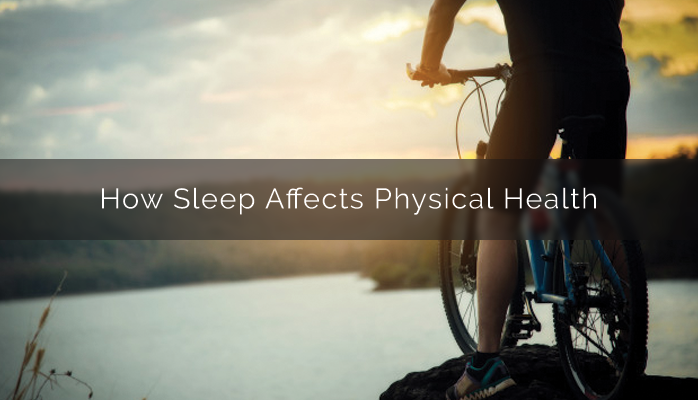Sleep – More Than Just Mental
Sleep deprivation may appear to affect you most mentally and emotionally with the fogginess and moodiness. If sleep deprivation only affected us mentally, it might be easier to get away with. Unfortunately, chronic sleep deprivation can be a silent killer as it takes a large toll on your physical health and performance, as well as mental and emotional health.
Sleep impacts many areas of your physical health:
- Immune system
- Brain
- Pain
- Safety
- Weight
Let’s look at how sleep affects these areas of your physical health.
Sleep and Immune System
Sleep affects how your body responds to and fights illness. During sleep, your immune system released proteins called cytokines. Under stress such as infection or inflammation, your body uses increased cytokines to help fight the sickness. When you are performing under chronic sleep deprivation, you naturally release less cytokines and, hence, may be more likely to get sick.
Also, a number of studies suggest that sleep helps the body produce immune cells, such as serum interleukin-7 (IL-7), which is significantly increased while you sleep. IL-7 plays an important role in creating immune cells like B and T cells.
On a more anecdotal note, people universally report that sleep is the best way to fight off early signs of sickness, as well as to prevent sickness in the first place.
Sleep and Brain Health
While we sleep, our brains are doing important mental work such as sorting, sifting, and storing new memories. Your brain also releases cerebrospinal fluid which is pumped around the brain and flushes out waste products.

Each of stage of sleep plays an important role in mental restoration. This picture shows someone with a sleep disorder (red) versus normal sleep (blue) - our brains spend time at each stage multiple times throughout the night.
Lack of sleep, even a small amount of sleep deprivation, impacts response times and cognitive ability. Moderate sleep deprivation is analogous to symptoms to being intoxicated.
Some concerns with this are:
- Athletic performance
- Safety (think driving under the influence)
- Physical and mental performance at work
Pain Management and the Role of Sleep
The extent to which you experience pain is mediated by cognitive processes. As discussed previously, sleep plays a fundamental role in your brain health, and in turn, is also an important factor in pain management. This is especially true of pain: lack of sleep significantly impacts pain management.
Consider the following statistics as proof:
- People with chronic pain had an average nightly sleep debt of 42 minutes (i.e. getting 42 minutes less sleep than they should)
- People with acute pain in the last week had an average sleep debt of 14 minutes
- 65 percent of people with no pain reported good or very good sleep quality
- 45 percent of people with acute pain in the last week reported good or very good sleep quality
- 37 percent of people with chronic pain in the last week reported good or very good sleep quality
- 23 percent of people with chronic pain reported being diagnosed with a sleep disorder by a doctor, compared to just 6 percent of pain free people. It’s quite a sobering statistic
Acute and chronic pain impact both sleep time and sleep quality. In turn, lack of sleep hampers your ability to manage pain. If you deal with chronic pain, sleep is all the more essential.
Sleep and Weight Management
If you are trying to manage weight, sleep will play an important role in this effort. Most obviously, lack of sleep:
- Decreases motivation
- Decreases physical energy
- Impacts mental energy, which is also important for physical activity.
Additionally, and perhaps even more significantly, research shows that sleep deprivation slows metabolism. Also, too little sleep triggers cortisol spikes, a stress hormone that signals your body to conserve energy (i.e. don’t burn energy/fat) to fuel your waking hours. In other words, your body will hang on to fat more when you are sleep deprived.
Sleep and Safety
Lastly, it’s extremely important to stress that sleep impacts your physical safety and the physical safety of others.
For example, when you go more than 19 hours without sleep, your cognitive awareness quickly degrades to the equivalent of having a blood alcohol content of .1% (or higher), which is about the same as being drunk and is also over the legal driving limit [Source: Moderate sleep deprivation produces impairments…]. The longer without sleep, the greater the impairment.
Think about the many activities where this level of impairment would compromise your safety or that of others:
- Driving
- Riding your bike
- Operating heavy machinery
- Performing an operation
Sleep deprivation is serious, and the causes of it may be related to a sleep disorder to other deficit. Regardless of the reason, sleep deprivation needs to be addressed and managed as soon as possible. If you live in Alaska and deal with chronic sleep deprivation in addition to poor physical performance, chronic pain, or chronic mental dips, please take this free online sleep assessment.


